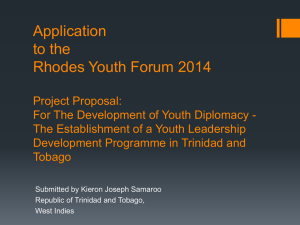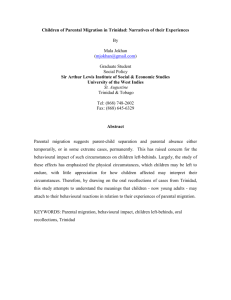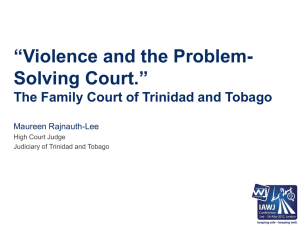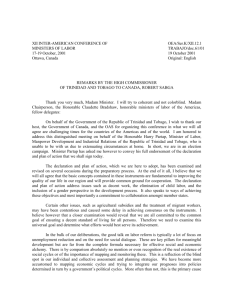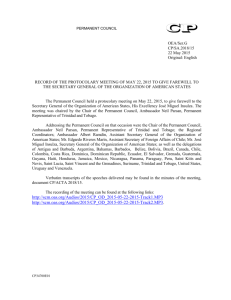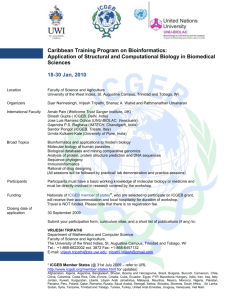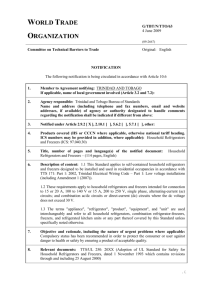MEMORY OF THE WORLD REGISTER
advertisement
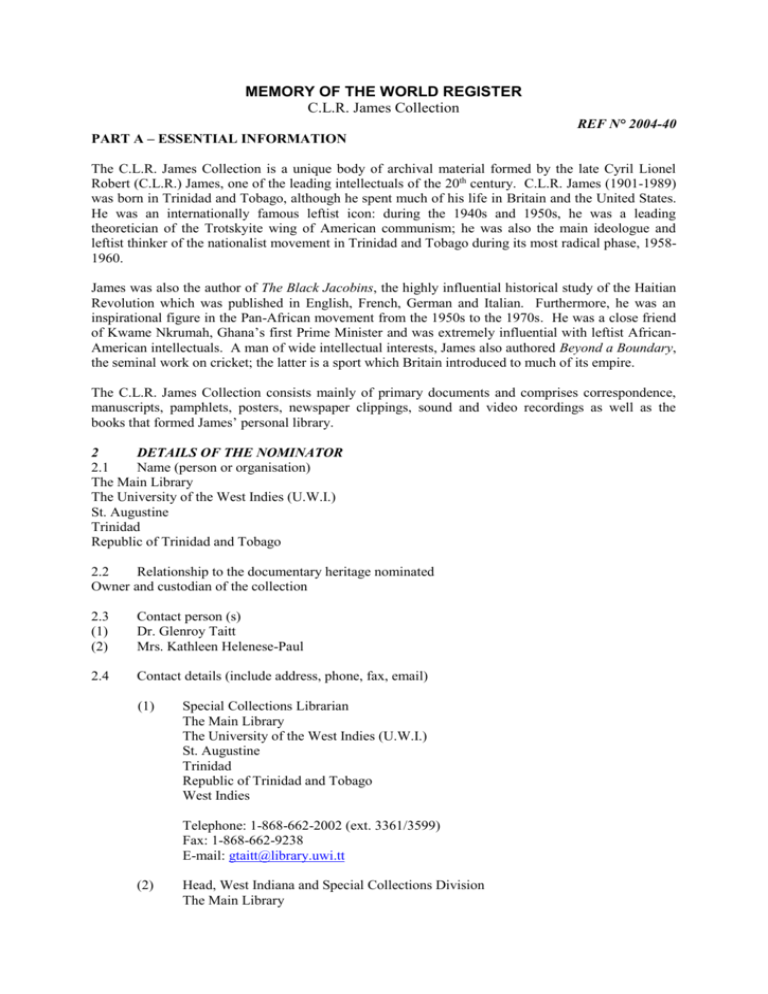
MEMORY OF THE WORLD REGISTER C.L.R. James Collection REF N° 2004-40 PART A – ESSENTIAL INFORMATION The C.L.R. James Collection is a unique body of archival material formed by the late Cyril Lionel Robert (C.L.R.) James, one of the leading intellectuals of the 20th century. C.L.R. James (1901-1989) was born in Trinidad and Tobago, although he spent much of his life in Britain and the United States. He was an internationally famous leftist icon: during the 1940s and 1950s, he was a leading theoretician of the Trotskyite wing of American communism; he was also the main ideologue and leftist thinker of the nationalist movement in Trinidad and Tobago during its most radical phase, 19581960. James was also the author of The Black Jacobins, the highly influential historical study of the Haitian Revolution which was published in English, French, German and Italian. Furthermore, he was an inspirational figure in the Pan-African movement from the 1950s to the 1970s. He was a close friend of Kwame Nkrumah, Ghana’s first Prime Minister and was extremely influential with leftist AfricanAmerican intellectuals. A man of wide intellectual interests, James also authored Beyond a Boundary, the seminal work on cricket; the latter is a sport which Britain introduced to much of its empire. The C.L.R. James Collection consists mainly of primary documents and comprises correspondence, manuscripts, pamphlets, posters, newspaper clippings, sound and video recordings as well as the books that formed James’ personal library. 2 DETAILS OF THE NOMINATOR 2.1 Name (person or organisation) The Main Library The University of the West Indies (U.W.I.) St. Augustine Trinidad Republic of Trinidad and Tobago 2.2 Relationship to the documentary heritage nominated Owner and custodian of the collection 2.3 (1) (2) Contact person (s) Dr. Glenroy Taitt Mrs. Kathleen Helenese-Paul 2.4 Contact details (include address, phone, fax, email) (1) Special Collections Librarian The Main Library The University of the West Indies (U.W.I.) St. Augustine Trinidad Republic of Trinidad and Tobago West Indies Telephone: 1-868-662-2002 (ext. 3361/3599) Fax: 1-868-662-9238 E-mail: gtaitt@library.uwi.tt (2) Head, West Indiana and Special Collections Division The Main Library The University of the West Indies (U.W.I.) St. Augustine Trinidad Republic of Trinidad and Tobago West Indies Telephone: 1-868-662-2002 (ext. 3506/3361) Fax: 1-868-662-9238 E-mail: khelenes@library.uwi.tt 3 IDENTITY AND DESCRIPTION OF THE DOCUMENTARY HERITAGE 3.1 Name and identification details of the items being nominated The C.L.R. James Collection 3.2 Description The collection includes correspondence, manuscripts (hand-written and typescripts) of works by James as well as manuscripts which other authors sent to James for his scrutiny, pamphlets, typescripts of speeches and interviews, lecture and course outlines, notebooks, flyers, newspaper clippings, videotapes and audio-cassettes all held by C.L.R. James, together with the books which formed his working library. Included among the papers are: Correspondence: the most sustained correspondence covers the period 1953-1989 and includes letters which James received as well as carbon copies of letters which he wrote. Material on the life of Pan-Africanist, George Padmore, a native of Trinidad and Tobago and a confidant of James. Based in the Soviet Union in the 1930s, Padmore helped to organise Soviet propaganda aimed at colonial subjects and African-Americans in particular. He later repudiated Stalinism and worked for the Pan-African Movement. Padmore subsequently became an advisor to Kwame Nkrumah, Ghana’s first Prime Minister. Flyers concerning the theatrical version of The Black Jacobins, from its premiere in Ibadan, Nigeria, in 1967 to subsequent performances in Kingston, Jamaica, and London, Britain. Manuscripts of works by James such as: - Black Jacobins (the play) - Toussaint L’Ouverture (as performed in London in 1936; this was the original version of Black Jacobins) - Beyond a Boundary - Mariners, Renegades and Castaways (penned in 1952 while James was imprisoned on Ellis Island, U.S.A.) - Triumph (a short story written in 1929 when James was part of a circle of West Indian writers) - Facing Reality (written jointly with G. Lee and P. Chaulieu in 1958 and inspired by the Hungarian Revolution of 1956) - James’ incomplete translation of Daniel Guérin’s book on the French Revolution entitled ‘The Class Sruggle’ - Drafts of book reviews and newspaper articles by James, many of which deal with the game of cricket - Typescripts of lectures delivered by James in Trinidad and Tobago, United States and Britain - His unfinished autobiography Manuscripts of works by other scholars which were sent to James for his comments. Many of these have annotations by James. James’ personal library: 4 This consists of approximately 1,500 volumes focusing on art, cricket, history, literature and philosophy including Marxism. JUSTIFICATION FOR INCLUSION/ ASSESSMENT AGAINST CRITERIA 4.1 Authenticity The collection was in James’ possession at the time of his death in Britain in 1989. It was subsequently offered for sale and was purchased by The University of the West Indies, St. Augustine, in 1997. 4.2 World significance, uniqueness and irreplaceability World significance: Although born in Trinidad, Trinidad and Tobago, in the West Indies, C.L.R. James’ reputation and sphere of influence transcended the national culture, and indeed all boundaries of geography. The C.L.R. James Collection documents James’ activities in the West Indies, England and the United States, and his deep interest in Africa. The Haitian Revolution: James’ play on the Haitian Revolution, Toussaint L'Ouverture, was staged in London in 1936, four years after James had migrated to Britain to pursue a career as a writer. The Haitian Revolution was a unique event in history, being the only successful slave revolt during the four centuries of plantation slavery in the Americas. That uprising led eventually to Haiti’s independence in 1804, the bicentenary of which is being celebrated this year. In 1938, James published a revised version of the play under the new title, Black Jacobins. The latter remains a classic treatise on the Haitian Revolution. Black Jacobins has appeared in English, French, German and Italian editions, evidence of the far-reaching influence of this book. Black Jacobins has also been released as a play which was first produced by Dexter Lyndersay at the University of Ibadan, Nigeria, in 1967. It has subsequently been staged by the Jamaica School of Drama’s Graduate Theatre Company in 1982 and by the Talwa Theatre Company in London in 1986. American communism: In 1938, James left Britain for the United States where he was deeply involved in the communist movement(s) over the next fifteen years. He visited Leon Trotsky in Mexico in 1939, and worked with Trotskyite parties in the United States. Along with Raya Dunayevskaya, a Russian-born intellectual, James established the Johnson-Forest group (later known as Correspondence and Facing Reality). Anna Grimshaw in her book, The C.L.R James Archive: A Reader’s Guide (New York: C.L.R. James Institute, 1991) says that “The work produced by James and his associates in the Johnson-Forest Tendency has been justly acclaimed as a major contribution to the theory and practice of revolutionary Marxism”. James eventually fell victim to the anti-communist hysteria that swept the United States in the late forties and early fifties. In 1952, he was imprisoned on Ellis Island and was forced to leave the country the following year. West Indian politics: Following a five-year residence in Britain, James returned to his native Trinidad and Tobago in 1958. He was invited back by Dr. Eric Williams to help in the nationalist movement symbolized by Williams’ political party, the People’s National Movement. James edited the party’s newspaper, The Nation, and emerged as the main ideologue and leftist thinker of the party during its most radical phase (1958-1960). During this time, James also served as secretary of the West Indian Federal Labour Party and was therefore one of the architects of the short-lived West Indies Federation. Pan-Africanism: Throughout his life, James was a strong advocate of Pan-Africanism. He was an associate of Kwame Nkrumah, the first Prime Minister of Ghana, a prominent supporter of the antiapartheid struggle in the 1970s and 1980s and was extremely influential with leftist African-American intellectuals. In 1985, James received the TransAfrica African Freedom Award from the AfricanAmerican group, TransAfrica. Cricket and Britain’s former empire: James was also a famed writer on cricket, the game which became synonymous with British colonialism. The leading cricket-playing territories are Australia, the West Indies, India, Pakistan, South Africa and New Zealand - all former British possessions. James’ book, Beyond a Boundary, published in 1963, which is a meditation on cricket, partly an autobiography and a brilliant description of Trinidad and Tobago’s colonial society, remains a classic. This book has also appeared in an American edition (published by Pantheon Books in 1983), although cricket does not have popular appeal in the United States. Uniqueness and irreplaceability: The papers consist mainly of original documents. Several of the books in James’ library are rare books. However, many of the volumes have annotations in James’ own handwriting which therefore make them primary documents as well. Thus scholars may wish to consult these works for James’ thoughts on what he was reading. The collection is therefore irreplaceable. 4.3 Criteria of (a) time (b) place (c) people (d) subject and theme (e) form and style The C.L.R. James Collection satisfies the criteria of (a) time (c) people and (d) subject and theme. It also satisfies the criterion of social value. Time: The C.L.R. James Collection opens a window to world affairs at a particularly important time in contemporary history. The collection largely covers the four decades after the Second World War. The pre-eminent event of that period was the Cold War when the advance of Marxism was a central preoccupation. James’ life and writings constitute a good case study for that turbulent era. The ending of European colonisation was another event of the period. The C.L.R. James Collection offers a case study of the decolonisation process, focusing on the West Indies. James himself was one of the earliest proponents of self-government for the then British West Indies. His pamphlet, The Case for West Indian Self-Government was first published in London in 1933. People: The C.L.R. James Collection is significant because its creator, C.L.R. James, was one of the foremost intellectuals of the 20th century. Moreover, he was a self-taught scholar. James never attended university, having ended his formal schooling at the secondary level; but through personal reading he became extremely knowledgeable in a wide range of disciplines. Although he never went to university, James lectured at Federal City College and Northwestern University in the United States in the late 1960s and early 1970s and, in the 1980s, was occasionally invited to speak at British universities. He also received honorary doctorates from four universities: The University of the West Indies, Mona, Jamaica (1971); Oakland University, Michigan in the U.S.A. (1971); the University of Hull in England (1983); and the University of Kent in England (1984). Apart from his awards from academia, James has received other honours as well. He was awarded the Trinity Cross – Trinidad and Tobago’s highest national award, and the TransAfrica African Freedom Award. Most recently, in October 2004, he was honoured with a blue plaque which was placed on the house where he lived in Brixton, London. These blue plaques are mounted on the facades of buildings throughout London to mark the houses associated with great men and women. Speaking at the unveiling ceremony, the British Culture Secretary described James as “one of the best black intellectuals, one of the greatest Caribbean writers and somebody who is a legend in the Caribbean community and a legend for this community here in Brixton” (Trinidad Express, Sunday edition, October 17th, 2004, p.15). As a Caribbean writer, James stands tall. He was the first writer from the former British West Indies to receive international recognition in the 1930s with his novel Minty Alley and his classic study of the Haitian Revolution. Subject and theme: The collection is also significant because it highlights four major themes in world history – Abolition of slavery; Pan-africanism; Marxism; Decolonization. Social value: The collection is of outstanding social/cultural value which transcends a national culture. This is particularly evident in James’ works, two of which can be cited here. Black Jacobins which has been published in several languages and which has been performed in Africa, the Caribbean and Britain. James’ writings on cricket, most notably Beyond a Boundary, have had a deep impact throughout the cricketing world. Apart from being a sport, cricket has lately been recognised as an academic discipline: The University of the West Indies, Cave Hill, in Barbados, has established a Centre for Cricket Research; there are also plans to include cricket in the academic curriculum of schools in India in 2005. Moreover, Beyond a Boundary, as scholars have realised, is more than merely a book about cricket. It “is now reputed to be James’ most important contribution to the discourse of postcolonialism”, according to Donald Pease in his introduction to Mariners, Renegades and Castaways (Hanover and London: University Press of New England, 2001). 4.4 Issues of rarity, integrity, threat and management None. 5 LEGAL INFORMATION 5.1. Owner of the documentary heritage (Name and contact details) Main Library The University of the West Indies, St. Augustine Trinidad Republic of Trinidad and Tobago West Indies 5.2 Custodian of the documentary heritage (Name and contact details, if different to owner) ____ 5.3 Legal status: (a) Category of ownership The collection is wholly owned by the Main Library, The University of the West Indies, St. Augustine. (b) Accessibility The collection is available for research by the University’s academic and research staff, graduate students and other bona fide researchers – local, regional and international. There is a Reading Room which has been designated for the purpose. (c) Copyright status The Copyright of all works by James, published and unpublished, rests with James’ estate. The University of the West Indies does not possess copyright over the collection. (d) Responsible administration The Main Library. (e) Other factors ______ 6 MANAGEMENT PLAN 6.1 Summary: The C.L.R. James Collection is one of the Special Collections within the Main Library’s West Indiana and Special Collections Division. The latter is a research collection containing published and unpublished material catering primarily for bona fide scholars and researchers. The library itself is fully air-conditioned. Furthermore, the C.L.R. James Collection is housed in a room with UV-filtered light where the entire space is controlled by motion and fire detectors linked to a central security system. For long-term conservation, the papers have been placed in acid-free folders and stored in acid-free boxes. There is a special reading room where the collection is consulted by researchers. This room is equipped with a camera surveillance system. Researchers must use either a pencil or a laptop computer as the use of pens is not permitted. Photocopying is allowed at the discretion of the librarian who considers factors such as the condition of the items in question. The papers have been inventoried and a database has been created using the CDS-ISIS software. James’ personal library has been kept as a separate entity within the West Indiana and Special Collections Division. However, the books are have all been catalogued and are accessible via the library’s online catalogue. The library has an audio-visual collection which houses the equipment necessary for consulting the video-tapes and sound recordings found in the C.L.R. James Collection. 7 7.1 CONSULTATION Provide details of consultation about this nomination with: (a) the owner of the heritage Not necessary since the collection is owned by the nominator. (b) the custodian Not necessary since the nominator is both owner and custodian of the collection. (c) your national or regional Memory of the World committee Trinidad and Tobago’s national representative on the Latin American and Caribbean Regional Committee for the Memory of the World suggested that the nomination of the C.L.R. James Collection be put forward. A copy of the nomination has been sent simultaneously to both the Regional and International Committees. PART B – SUBSIDIARY INFORMATION 8 ASSESSMENT OF RISK 8.1 Printed materials tend to decay after a number of years unless they are properly treated and stored. For audio-visual material, the main threat is the obsolescence of play-back equipment. This is particularly evident with reel-to-reel audio-tapes. There is also the possible threat of water-damage resulting from a hurricane. Although Trinidad and Tobago lies just below the hurricane belt, this threat cannot be underestimated. The library is therefore taking steps to enhance the security of the building in the event of a hurricane or other such disaster. 9 ASSESSMENT OF PRESERVATION 9.1 The Main Library at The University of the West Indies, St. Augustine, has a Bindery and Conservation Unit under the direction of the Head, Technical Services. The library also has a professional trained in conservation techniques. The library is also considering digitising parts of the collection as a form of preservation. PART C - LODGEMENT This nomination is lodged by: (Please print name) …………………………………….. (Signature)………………………………… (Date)……………
